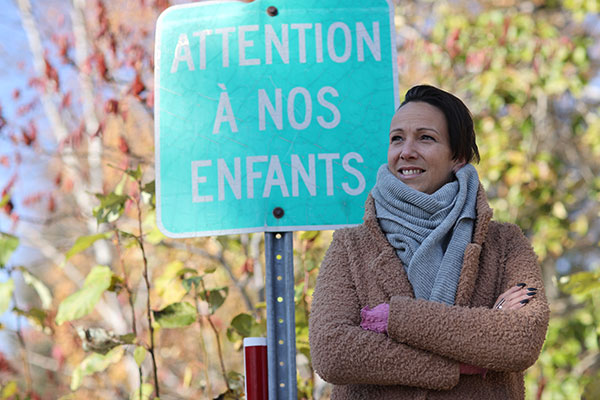On March 13, 2020, FIPEQ-CSQ1 president Valérie Grenon had planned on demonstrating in front of Sherbrooke’s Salon Priorité-Emploi as part of progressive strikes by regulated and subsidized home childcare providers. Instead, she spent the day in crisis management mode when she had to suspend all pressure tactics urgently.
“At 10 a.m., we announced the suspension of our pressure tactics and at 1 p.m., we found out that the Minister of Families was closing all educational services,” recalls Valérie Grenon. Forty-eight hours later, early childcare workers would finally hear that all services had to reopen to provide emergency childcare.
“We spoke daily with the Minister of Families for updates,” says the president. “What was good on one day was often not good the next day. It was hard for me to keep up so I can imagine the confusion of workers.” She cites the rapidly evolving guidelines for wearing personal protective equipment, which was not recommended in April but became mandatory in June. “For our part, we have always advocated for freedom of choice for educators,” says Valérie Grenon.
Reason to be proud
Since March, the health crisis has brought its share of challenges to early childcare environments. “Despite everything, there is reason to be proud, especially when we think of salaries that continued to be paid to workers represented by our federation, until the gradual reopening of centres,” says Valérie Grenon. “It was quite a struggle! We could tell the government was looking to the Canada Emergency Benefit, but we needed to maintain a link with the workers to be ready for the reopening.”
Despite numerous requests and public interventions on the part of the FIPEQ-CSQ, the government rejected the idea of paying an additional bonus, as was the case in other activity areas. To counter the labour shortage, the minister finally had to reduce the ratio of educators trained in childcare centres. “Above all, the temporary measures concerning the training of educators must not become permanent,” worries the union representative.
She adds that little is heard about the quality and importance of interactions with the little ones during the pandemic. “When we suggested having window masks to promote language comprehension, we were told they were too expensive. But what will be the cost of all of these changes in the development of our children? That, nobody knows.”
Decisive negotiations for the profession
2020 is a year of negotiations for the FIPEQ-CSQ as the two sectors it represents, the CPEs2 and home childcare services, are due to renew their employment contracts.
Negotiations for regulated and subsidized home care educators ended with an agreement in principle approved by 82.4%. Although considerable gains have been made on the collective agreement's normative aspect, the battle for better salaries will continue in a compensation committee.
As for national CPE negotiations, they are still underway. Workers have made several demands to improve their employment conditions, which have deteriorated dramatically with the COVID-19 pandemic.
“Shortly after the health emergency was declared, we reached out to the Minister of Families to settle our two negotiations fast,” explains Valérie Grenon. “Our proposal was ultimately rejected and each sector continued with traditional negotiations. But perhaps we would not be experiencing today’s shortage if our working conditions had been improved sooner with COVID-19 bonuses at the start of the pandemic.”
Despite everything, the president is delighted with the groundswell of support in the population for better salaries for professionals who care for our little ones. Several experts and civil society organizations have recently been vocal in their support.

A three-part action plan
In addition to the negotiations for the CPE sector, the Federation intends to act on three priority aspects over the next year.
First, the work begun to promote the profession will continue. In 2018, the Fédération launched the J’élève la profession campaign, which aims to highlight the professionalism of childcare workers. “Recognition is one of our top concerns,” emphasizes Valérie Grenon. “Ultimately, we are making sure that all our actions have a positive impact on the recognition of our essential work.”
Before the pandemic, the FIPEQ-CSQ had organized regional tours with pediatrician Jean-François Chicoine to offer its members and the population a different perspective on the importance of interventions with children aged 0 to 5 years. These conferences have been put on hold due to the health situation, but a committee is looking into setting up virtual activities.
The second major component of the FIPEQ-CSQ’s game plan focuses on the development of the early childhood network. Several issues risk disrupting CPEs and home childcare services in the long term. For example, think of the bills that aim to regulate non-recognized childcare services and convert unsubsidized daycare spots into subsidized ones, as well as various calls for projects to create new spots.
“For all of these upcoming projects, we need to keep our most vulnerable children in mind,” says Valérie Grenon. “The early childhood network must be a vector of development for them.” She also emphasizes the importance of parents’ voices being heard. “We know that families in Québec are proud of their network and want more spots at $8.35 than private spots.”
Finally, the Federation will continue its development campaign as most childcare workers in Québec are non-unionized. “For the CPE sector to have a real impact on the ministry, unionization is the only solution,” says Valérie Grenon. “The union should not be seen as an opponent of the CPEs, which are non-profit organizations. The employer depends almost entirely on the government’s budgetary rules, hence the importance of coming together as a national federation.”
When asked why a worker in a childcare centre or home environment should choose the FIPEQ-CSQ rather than another union, Valérie Grenon answers without hesitation, “it is the only federation dedicated exclusively to childcare workers, and that makes all the difference!”
1 Fédération des intervenantes en petite enfance du Québec (FIPEQ-CSQ).
2 Centres de la petite enfance.
